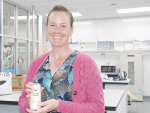AS WEANER calf sales get underway across the country, pay close attention to the health status of any animals you intend buying.
Veterinarian and farm consultant, Trevor Cook made this the theme of his talk to a recent BLNZ field day at Pahiatua in the Northern Wairarapa.
He says try to be aware of how a calf has been reared – particularly those coming out of calf rearing systems.
“The early background of those calves does have an influence on their ability to grow and their susceptibility to disease. So in the first place it’s how much, if any, colostrum they’ve had.”
Cook says there’s “some good evidence” that a lot of calves coming out of dairy systems have had no colostrum and that has a lasting negative effect on growth rates.
It also increases susceptibility to disease, so the chance of a loss due to death, or bill for dealing with sick animals, is increased.
“So colostrum status can set a ceiling on productive outcomes,” he stresses.
Another key issue affecting calves future growth rates is rumen development, he adds.
“If they come out of a calf rearing system and their rumen is well developed, they are much more able to cope with a pasture based diet and be able to grow well on it. Whereas if they come out of that calf rearing system with a poorly developed rumen, they struggle for some time to cope with good pasture.”
Know where your calves come from, and how and who’s reared them, is the message. There are very good rearers who consistently deliver calves which will perform, and it’s a direct result of their skills, says Cook.
He also warns calves can come with mineral deficiencies which are not immediately obvious, and recommends doing blood and liver tests so any supplementation is based on a known need.
Copper is one possible deficiency such tests will reveal. How to deal with it is a case of finding the most cost effective and practical system for your farm.
There are suggestions copper deficiency is linked to worm problems, he notes, however from a practical point of view that’s not the issue: having an adequate copper status is, for more than just liveweight gain.
“It probably makes those animals more robust and able to cope with animal health challenges,” he says.
That’s not to say worm challenges don’t need dealing with too, and he warns apparently small liveweight gain deficits caused by copper deficiency and a worm challenge, which are unlikely to be visibly noticeable, will accumulate over the year to be a significant cost.
“It’s very easy to show very small live weight gain deficits that are occurring on almost a daily basis can be costing between $200 - $300 per hectare in lost in income. It’s a production loss which isn’t observed because there’s not enough monitoring going on to actually pick it up.”
It is worth looking after such things that nibble away at liveweight gain, he believes.
“We focus on feed and feed quality which are the major drivers of liveweight gain but there are other things which can have an ongoing impact and which take the icing off the cake in terms of profit.”



















